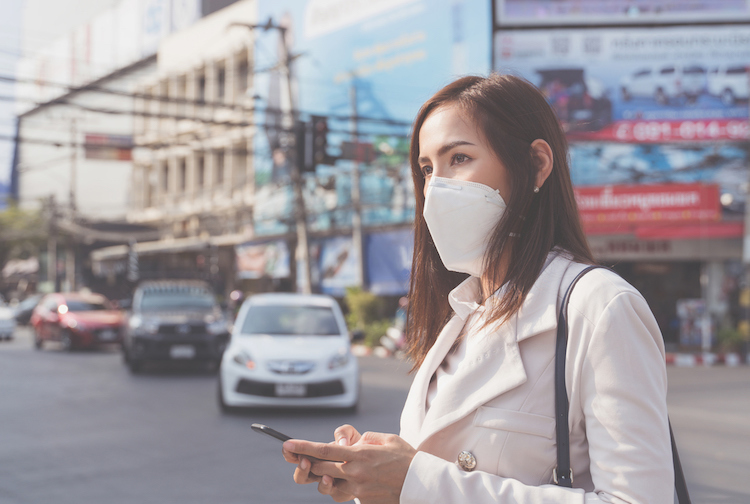
Wildfires, poor air quality concerns for your lungs
People living in areas with increased wildfire smoke are advised by health experts to limit their time outside and wear facemasks.
August 17, 2023 Wearing a facemask is one way to reduce exposure to potential chemicals, metals and plastic particles found in wildfire smoke. (Getty Images)
Wearing a facemask is one way to reduce exposure to potential chemicals, metals and plastic particles found in wildfire smoke. (Getty Images)
By Sara McCloskey
People across the country have witnessed the devastation caused by wildfires in Canada, the West Coast and the Hawaiian island of Maui. These fires not only change the landscape but affect the air quality for millions in those regions and beyond.
Breathing in wildfire smoke is more harmful than other types of air pollution, as it can travel hundreds of miles and linger for weeks. Unlike smoke from a bonfire, wildfire smoke may contain chemicals, metals and plastic particles from burned vehicles and buildings.
Health experts say residents in areas with decreased air quality from wildfire smoke should limit time outdoors and wear facemasks to reduce exposure.
“When air quality is poor, exercise outside may cause respiratory symptoms including cough, wheeze or difficulty breathing,” said Drew Barber, M.D., a pulmonologist at Children’s Hospital of Richmond at VCU. “Listen to your body. If you start to experience these symptoms, stop to rest and consider moving your workout indoors. Those with asthma should be especially weary of exercise outdoors when the air quality is poor.”
VCU Health News spoke with Barber about the impact smoke has on the lungs and what treatments are available for vulnerable populations diagnosed with chronic lung conditions.
What health concerns are there when air quality conditions are not good?
When air quality conditions are not good, this can cause sudden worsening of underlying chronic lung conditions, particularly asthma. This can result in an asthma exacerbation, which is when a person with asthma has trouble breathing, wheezing, and/or persistent coughing.
Similar symptoms may occur in other people with other chronic lung diseases, like pulmonary fibrosis. In individuals who are otherwise healthy, poor air quality will likely not cause any damage to the lungs or result in any new symptoms, as long as exposure to the poor air is not long-term.
What does breathing in thick smoke or smoke particles do to your body?What symptoms can they cause?
Breathing in smoke or other pollutants in the air can cause the airways of the lungs to become sensitive and swell or spasm, which may result in the sensation of shortness of breath, also called dyspnea. This can also cause wheezing or persistent coughing. Again, this is much more likely to occur in individuals who have underlying lung diseases and less likely to occur in those who do not have any chronic lung disease.
At what point should I call my primary care provider after being exposed to unhealthy air quality conditions for a prolonged period of time? What treatment options are available?
You should only contact your primary care provider if you start to experience new symptoms, like coughing, wheezing or difficulty breathing. Also, make sure you follow your provider’s directions if they prescribe or recommend you use any inhalers or other respiratory medications.
If you do not have any underlying chronic lung disease, there are no medications that would be helpful. Instead, if you experience symptoms you should try to remain inside, use a HEPA air filter if available and wear a high-quality facemask when outside.
Those with asthma should make sure they’re taking their controller inhaler, which is considered prevention treatment, if they’re prescribed one. If they are experiencing new symptoms when there are poor air conditions, then their primary care provider may recommend starting a new controller inhaler (containing inhaled steroids) or may prescribe a course of oral steroids. They can also take albuterol as directed by their physician for acute relief of symptoms. However, be sure to use proper inhalation technique and contact your doctor if you need albuterol frequently. These medications decrease inflammation in the airways, which reduce swelling and spasms, making it easier to breathe.
Are there certain individuals who may be more vulnerable than others?
Yes, those with asthma and other chronic lung conditions are more vulnerable than others.
Aside from particles from wildfires, what other things can decrease the air quality?
Pollution can decrease air quality. This will likely not cause such rapid and drastic changes in air quality as we can see with wildfires, but over long periods of time pollution can cause gradual worsening of air quality.



